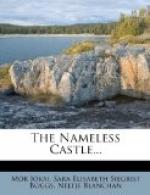“Oh, how my heart beats!”
When Ludwig appeared with the canoe from behind the willows, the charming Naiad stepped from the bath-house. The rippling waves bore the moonlight to her feet, where she stood on the narrow platform which projected into the lake. She knelt and, bending forward, kissed the water; it was her beloved! After a moment’s hesitation she dropped gently from the platform, as she had been wont to do; but when she felt the waves about her shoulders, she uttered a cry of terror, and grasped the edge of the canoe with both hands.
“Lift me out, Ludwig! I cannot bear it; I am afraid!”
With a sorrowful heart the little maid took leave of her favorite element. The hot tears gushed from her eyes, and fell into the water; it was as if she were bidding an eternal, farewell to her beloved. From that hour the child became a silent and thoughtful woman.
* * * * *
Then followed the stormy days of autumn, the long evenings, the weeks and months when nothing could be done but stay in doors and amuse one’s self with books—Dante, Shakspere, Horace. To these were occasionally added learned folios sent from Stuttgart to Count Ludwig, who seemed to find his greatest enjoyment in perusing works on philosophy and science. Meanwhile the communication by letter between the count and the erudite shepherd of souls in the village was continued.
One day Herr Mercatoris sent to the castle a brochure on which he had proudly written, “With the compliments of the author.” The booklet was written in Latin, and was an account of the natural wonder which is, to this day, reckoned among the numerous memorable peculiarities of Lake Neusiedl,—a human being that lived in the water and ate live fishes.
A little boy who had lost both parents, and had no one to care for him, had strayed into the morass of the Hansag, and, living there among the wild animals, had become a wild animal himself, an inhabitant of the water like the otters, a dumb creature from whose lips issued no human sound.
The decade of years he had existed in the water had changed his skin to a thick hide covered with a heavy growth of hair. The phenomenon would doubtless be accepted by many as a convincing proof that the human being was really evolved from the wild animal.
Accompanying the description was an engraved portrait of the natural wonder.
The new owner of Fertoeszeg, Baroness Katharina Landsknechtsschild, had been told that a strange creature was frightening the village children who bathed in the lake. She had given orders to some fishermen to catch the monster, which they had been fortunate enough to do while fishing for sturgeon. The boy-fish had been taken to the manor, where he had been properly clothed, and placed in the care of a servant whose task it was to teach the poor lad to speak, and walk upright instead of on all fours, as had been his habit. Success had so far attended the efforts to tame the wild boy that he would eat bread and keep on his clothes. He had also learned to say “Ham-ham” when he wanted something to eat; and he had been taught to turn the spit in the kitchen. The kind-hearted baroness was sparing no pains to restore the lad to his original condition. No one was allowed to strike or abuse him in any way.




